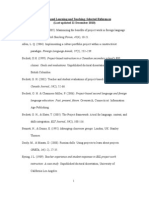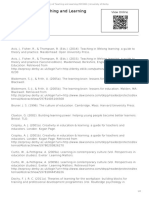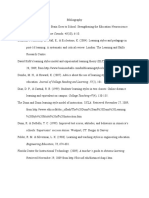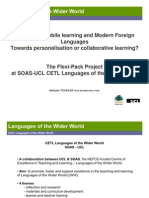List of References
List of References
Uploaded by
nvtichelerCopyright:
Available Formats
List of References
List of References
Uploaded by
nvtichelerCopyright
Available Formats
Share this document
Did you find this document useful?
Is this content inappropriate?
Copyright:
Available Formats
List of References
List of References
Uploaded by
nvtichelerCopyright:
Available Formats
Annetta, L.A. (2010). V-Learning. Distance Education in the 21st Century through 3D VLEs.
Springer: Dordrecht, Heidelberg, London, New York. Attwell, G & Hughes, J. (2010). Pedagogic Approaches to Using Technology for Learning. Literature Review. http://tinyurl.com/6zqs6r2 Barbosa, E.F. & Maldonado, J.C. (2011). Collaborative Development of Educational Modules: A Need for Lifelong Learning. In E-Infrastructures and Technologies for Lifelong Learning. Next Generation Environments. Edited by Magoulas, G. Information Science Reference: Hershey. p175211. Barker, P. (2008). Blended Electronic Learning: Managing the Blend. In Proceedings of the Third International Blended Learning Conference. Enhancing the Student Experience. University of Hertfordshire: Hatfield. p45-53. Bax, S. (2003). CALL: Past, Present, Future. Elsevier Ltd. http://tinyurl.com/57pl4j Bax, S. (2006a). A First Step to Second Nature. Guardian Weekly. 7th April 2006. http://tinyurl.com/yeouuny Bax, S. (2006b). Contributions to Forum on Normalisation of CALL. In The Electronic Journal for English as a Second Language. March 2006. Vol 9 No 4. http://tinyurl.com/cpkw8dq Beetham, H., Mcgill, L. & Littlejohn, A. (2009). Thriving in the 21st Century: Learning Literacies for the Digital Age (LLIDA Project). The Caledonian Academy, Glasgow Caledonian University. http://tinyurl.com/2u6rmwv Bennett, S., Maton, K. & Kervin, L. (2008). The Digital Natives Debate: A Critical Review of the Evidence. In The British Journal of Educational Technology. http://tinyurl.com/7va7ry5 Vol 39 No 5. p775-786. Bennett, S. & Maton, K. (2011). Intellectual Field or Faith-Based Religion: Moving on from the Idea of Digital Natives. In Deconstructing Digital Natives. Young People, Technology and the New Literacies. Edited by Thomas, M. Routledge: London & New York. p169-185. Bennett, S. & Oliver, M. (2011). Talking Back to Theory. The Missed Opportunities in Learning Technology Research. In Research in Learning Technology. November 2011.http://tinyurl.com/8x47l7l Vol 19. Issue 3. p179-189. British Academy. (2011). Language Matters More and More. A Position Statement. http://tinyurl.com/6742sdl British Broadcasting Association (BBC) Languages http://www.bbc.co.uk/languages British Educational Research Association (BERA) (2011). Ethical Guidelines for Educational Research http://tinyurl.com/75tv7w9 Browne, T., Hewitt, R., Jenkins, M., Voce, J., Walker, R., Yip, H. (2010). Survey of TechnologyEnhanced Learning for Higher Education. UCISA: Oxford http://tinyurl.com/6byd5zr Bruner, J. (2006). Selected Works of Jerome Bruner. In Search of Pedagogy. Vol 1. Routledge: Abingdon.
Canning, J. (2008). Five Years On: The Language Landscape in 2007. Subject Centre for Languages, Linguistics and Area Studies: Southampton. http://tinyurl.com/ctydnfb Chambers, A. & Bax, S. (2006). "Making CALL Work: Towards Normalisation", http://tinyurl.com/7efyt4u System 34, 4: p465-479. Charlesworth, A. (2008). Code of Practice for the Further and Higher Education Sectors on the Data Protection Act 1998. JISC Legal. http://tinyurl.com/ktt36c Cochrane, T. & Bateman, R. (2010). Strategies for Mlearning Integration: Evaluating a Case Study of Staging and Scaffolding Mlearning Integration across a Three-Year Bachelors Degree. In Proceedings of the 17th Association for Learning Technology Conference. Into Something Rich and Strange. Making Sense of the Sea-Change. ALT-C Conference. 7th to 9th September. University of Nottingham. Edited by Creanor, L., Hawkridge, D., Ng, K. & Rennie, F. http://tinyurl.com/77j5e7t. p11-20. Coffield F.J., Moseley D.V., Hall E. & Ecclestone, K. (2004). Should We Be Using Learning Styles? What Research Has to Say to Practice. London: Learning and Skills Research Centre/University of Newcastle upon Tyne. http://tinyurl.com/7pgu5do Committee of Inquiry into the Changing Learner Experience. http://tinyurl.com/7z6o4dg Conole, G., de Laat, M., Dillon, T. & Darby, J. (2006). JISC LXP: Student Experiences of Technologies. Final Report of the JISC-funded LXP project. University of Southampton. http://tinyurl.com/6djy7w3 Conole, G., White, S. & Oliver, M. (2007). The Impact of E-learning on Organisational Roles and Structures. In Contemporary Perspectives in E-learning Research, Themes, Methods and Impact on Practice. Edited by Conole, G. & Oliver, M. Routledge: New York. p69-81. Conole, G. & Alevizou, P. (2010). A Literature Review of the Use of Web 2.0 Tools in Higher Education. Open University: Milton Keynes. http://tinyurl.com/33ujhfa Cook, J., White, S., Sharples, M., Sclater, N & Davis, H. (2007). The Design of Learning Technologies. In Contemporary Perspectives in E-Learning Research Themes, Methods and Impact on Practice. Edited by Conole, G. & Oliver, M. Routledge: London. p55-68. Creswell, J. (2003). Research Design: Qualitative, Quantitative and Mixed Methods Approaches. 2nd edition. Sage Publications: Thousand Oaks, California. Creswell, J. (2007). Qualitative Inquiry and Research Design: Choosing Among Five Approaches. 2nd edition. SAGE: Thousand Oaks, CA. Creswell, J. & Plano Clark, V. (2007). Designing and Conducting Mixed Methods Research. Sage Publications, Inc: London. Crotty, M. (2003). The Foundations of Social Research: Meaning and Perspective in the Research Process. SAGE: London. Data Protection Act (1998) http://tinyurl.com/2c26dx8 Department for Education and Skills. (2002). Languages for All. Languages for Life. A Strategy for England. DFES: Nottingham. http://tinyurl.com/76txzp3 Ellis, R.A. & Goodyear, P. (2010). Students Experiences of E-learning in Higher Education. The Ecology of sustainable Innovation. Routledge: Abingdon
Elliott, B. (2009). E-pedagogy. Does E-learning Require a New Approach to Teaching and Learning? Scottish Qualifications Authority. http://tinyurl.com/d2phnu Epacks http://www.londonmet.ac.uk/epacks European Association for Computer-Assisted Language Learning (EUROCALL) http://www.eurocall-languages.org Garrison, D.R. & Anderson, T. (2003). E-learning in The 20th Century. A Framework for Research and Practice. Routledge Falmer: London Garrison, D.R. (2011). E-learning in the 21st century. A Framework for Research and Practice. 2nd edition. Routledge: Abingdon. Garrison, D.R. & Vaughan, N.D. (2008). Blended Learning in Higher Education. Framework, Principles and Guidelines. Jossey-Bass: San Francisco. Gillespie, J. (2011). Constructing the Teaching Triangle: Linking Student, Teacher and Institution. The CALL Triangle: Student, Teacher and Institution. Book of abstracts and presentation. EUROCALL 2011. 31ST August to 3rd September. Nottingham, England. EUROCALL: Nottingham. p144. Graf, S., Liu, T.C. & Kinshuk (2010). Analysis of Learners Navigational Behaviour and their Learning Styles in an Online Course. Journal of Computer-Assisted Language Learning. Vol 26. http://tinyurl.com/7es29j9. p116-131. Green, H. & Hannon, C. (2007). Their Space: Education for a Digital Generation. Demos. http://tinyurl.com/2k7m7a Greenfield, S. (2007). In Times Educational Supplement Magazine (29 July 2007) Hargreaves, D et al. (2005). About Learning. Report of the Learning Working Group: London. http://tinyurl.com/799axwl Haythornthwaite, C. (2007). Digital Divide and E-learning. In The SAGE Handbook of E-learning Research. Edited by Andrews, R. and Haythornthwhite, C. Sage Publications Ltd: London. p97118. Haythornthwaite, C & Andrews, R. (2011). E-Learning Theory and Practice. Sage Publications Ltd :London. HEFCE. (2005). Strategy for E-learning. http://tinyurl.com/3mb6t HEFCE. (2007). Strategic Plan 2006-2010 (updated April 2007) http://tinyurl.com/5z7gaz HEFCE. (2009). Enhancing Learning and Teaching Through The Use of Technology. A Revised Approach to HEFCEs Strategy for E-learning. http://tinyurl.com/c9jymn Higher Education Funding Council for England. http://www.hefce.ac.uk Higher Education Academy http://www.heacademy.ac.uk Hoadley, C. (2007). Learning Sciences Theories and Methods for E-learning Researchers. In The
SAGE Handbook of E-learning Research. Edited by Andrews, R. & Haythornthwhite, C. Sage Publications Ltd: London. p139-153. Holmes, B. & Gardner, J. (2006). E-Learning: Concepts and Practice. Sage: London. Joint Information Systems Committee (JISC). http://www.jisc.ac.uk Joint Information Systems Committee. (2008/2009). LLIDA Project. Learning Literacies for a Digital Age. http://tinyurl.com/6c7r7hl Jones, A. & Issroff, K. (2007). Learning Technologies. Affective and Social Issues. In Contemporary Perspectives in E-learning Research, Themes, Methods and Impact on Practice. Edited by Conole G. & Oliver, M. Routledge: New York. p190-202. Jones, C & Czerniewicz, L. (2010). Describing or Debunking? The Net Generation and Digital Natives. In The Journal of Computer-Assisted Language Learning. No26. http://tinyurl.com/6p77c47 p317-320. Jones, C. (2011). Students, the Net Generation and Digital Natives: Accounting for Educational Change. In Deconstructing Digital Natives. Young People, Technology and the New Literacies. Edited by Thomas, M. Routledge: London & New York. p30-45. Jung, I. & Latchem, C. (2011). A Model for E-Education: Extended Teaching Spaces and Extended Learning Spaces. In The British Journal of Educational Technology. http://tinyurl.com/7m2calq Vol 42. No 1. p 6-18. Kelly, M. & Jones, D. (2003). A New Landscape for Languages. Nuffield Foundation: London. http://tinyurl.com/7zn3ptf Kelly, M. (2008). Foreword. In Five Years On: The Language Landscape in 2007. LLAS: Southampton http://tinyurl.com/6p9nvk6 Lankshear, C & Knobel, M. (2008). Introduction. Digital Literacies- Concepts, Policies and Practices. In Digital Literacies. Concepts, Policies and Practices. Edited by Lankshear, C & Knobel, M. Peter Lang Publishing Inc: New York. p1-16. LANQUA (2010). A Quality Toolkit for Languages. The Quality Model. LLAS: Southampton. http://tinyurl.com/cejjllu LANQUA (2010). A Quality Toolkit for Languages. The Frame of Reference. LLAS: Southampton. http://tinyurl.com/coaemly LANQUA (2010). A Quality Toolkit for Languages. Final Report (Public Part). LLAS: Southampton. http://tinyurl.com/d63wwqo Laurillard, D. (2002). Rethinking University Teaching: A Conversational Framework for the Effective Use of Learning Technologies. 2nd edition. Routledge: London. Laurillard, D. (2008). Technology-Enhanced Learning as a Tool for Pedagogical Innovation. In The Journal of Philosophy of Education. Special Issue: New Philosophies of Learning. Edited by Cigman, R. & Davis, A. http://tinyurl.com/89yyp84 Vol 42. Issue 3-4. p521-533 Laverty, S.M. (2003). Hermeneutic Phenomenology and Phenomenology: A Comparison of Historical and Methodological Considerations. In The International Journal of Qualitative Methods. Sept 2003 http://tinyurl.com/76kvlt6
Levy, M. & Kennedy, C. (2005). Learning Italian via Mobile SMS. In Mobile Learning: A Handbook for Educators and Trainers. Edited by Traxler, J. & Kukulska-Hulme, A. Routledge: London. p76-83. Levy, M. (2006). Effective Use of CALL Technologies: Finding the Right Balance. In Changing Language Education through CALL. Edited by Donaldson, R.P. & Haggstrom, M.A. Routledge: Abingdon. p1 to 17. Little, D. (2001). How Independent can Independent Language Learning Really Be? In LanguageLearning Futures: Issues and Strategies for Modern Languages Provision in Higher Education. Edited by Coleman, J.A., Ferney, D., Head, D. & Rix, R. CILT: London. p30-43. Littlejohn, A. & Pegler, C. (2007). Preparing for Blended E-Learning. Routledge: Abingdon. London Metropolitan University (2010a). Strategic Plan (2010/2013). Transforming Lives, Meeting Needs, Building Careers. http://tinyurl.com/cs9lq26 London Metropolitan University (2010b). Learning and Teaching Strategy Framework http://tinyurl.com/68z3bfk London Metropolitan University (2010c). E-Learning Strategy. http://tinyurl.com/6z93rwz London Metropolitan University (March 2011). Quick Guide to Blended Learning at London Metropolitan University. A 1-2-3 Guide to Blending Face-to-Face with Online Learning and Teaching. http://tinyurl.com/6qwzzpr Macdonald, J. (2006). Blended Learning and Online Tutoring. A Good Practice Guide. Gower Publishing: Burlington (VT) Maltby, A. & Mackie, S. (2009). Virtual Learning Environments. Help or Hindrance for the Disengaged Student? In Research in Learning Technology. http://tinyurl.com/6w7eqs7 Vol 17. No 1. March 2009. p49-62. Mason, R. & Rennie, F. (2006). E-Learning. The Key Concepts. Routledge: Abingdon. Mason, R. & Rennie, F. (2008). E-learning and the Social Network Handbook. Resources for Higher Education. Routledge: Abingdon. Mayes, T. & de Freitas, S. (2007). Learning and E-learning. The Role of Theory. In Rethinking Pedagogy for a Digital Age, Designing and Delivering E-learning. Edited by Beetham,H. & Sharpe, R. Routledge:. London. p13-25. Mayes, T. (2009). All in the Mind: Programmes for the Development of Technology-Enhanced Learning in Higher Education. In Transforming Higher Education through Technology-Enhanced Learning. http://tinyurl.com/48dfo4g Edited by Mayes, T., Morrison, D., Mellar, H., Bullen, P. & Oliver, M. (2009). Higher Education Academy: York. p46-57. Motteram, G & Sharma, P. (2009). Blended Learning in a Web 2.0 World. In The International Journal of Emerging Technologies & Society. http://tinyurl.com/7ewxlyd Vol 7, No2. p83-96. National Centre for Languages (CILT) http://www.cilt.org.uk National Centre for Languages (CILT). (2009). CILT Analysis of HESA data 2002/2003 to 2007/2008 http://tinyurl.com/67bkhjn
National Student Survey (2010). http://tinyurl.com/7h8sn23 New Media Consortium (NMC). (2012). Horizon Project Preview 2012. Higher Education Edition. http://tinyurl.com/6w987bv NUS. (2010). Student Perspectives on Technology. Demand, perception and Training Needs. http://tinyurl.com/2wbblua Oblinger, D.G. & Oblinger, J.L. (2005). Introduction. In Educating the Net Generation. http://tinyurl.com/h55tv Educause: Washington. p6-10. Oliver, M. (2006). Shift in pedagogical and learning practices. Editorial. New Pedagogies for elearning? In Research in Learning Technology. http://tinyurl.com/7jpff34 Vol 14. No 2. June 2006. p133-134. ALT: Oxford. OLTF. (2011). Collaborate to Compete. Seizing the Opportunity of Online Learning for the UK Higher Education. Report to HEFCE. http://tinyurl.com/6yssalz Pachler, N. & Daly, C. (2011). Key Issues in E-learning: Research and Practice. Continuum: London. Plenderleith, J. & Adamson, V. (2009). The Policy Landscape of Transformation. In Transforming Higher Education through Technology-Enhanced Learning. http://tinyurl.com/6tdlhzg Edited by Mayes, T., Morrison, D., Mellar, H., Bullen, P. & Oliver, M. Higher Education Academy: York. p618. Prensky, M. (2001). Digital Natives, Digital Immigrants. From On the Horizon. MCB University Press, Vol. 9 No. 5, October 2001. http://tinyurl.com/65gej7h Prensky, M. (2010). Teaching Digital Natives. Partnering for Real Learning. Cowin: London. Prensky, M. (2011). Digital Wisdom and Homo Sapiens Digital. In Deconstructing Digital Natives. Young People, Technology and the New Literacies. Edited by Thomas, M. Routledge: London & New York. p15-29. Routes into Languages http://www.routesintolanguages.ac.uk Salmon, G. (2002). E-tivities. The Key to Active Online Learning. Kogan Page Ltd: Abingdon. Salmon, G. (2011). E-Moderating. The Key to Teaching and Learning Online. Third Edition. Routledge: New York & London. Selwyn, N., Gorard, S. & Furlong, J. (2006). Adult Learning in the Digital Age. Information Technology and the Learning Society. Routledge Falmer: London & New York. Selwyn, N. (2009). The Digital Native. Myth and Reality. In ASLIB Proceedings. http://tinyurl.com/7bc2pkb Vol 61. No 4. p364-379. Selwyn, N. (2011). Education and Technology. Key Issues and Debates. Continuum International Publishing Group: London & New York.
Sharpe, R., Benfield, G., Roberts, G & Francis, R. (2006). The Undergraduate Experience of Blended E-Learning. A Review of UK Literature and Practice. Higher Education Academy: York. http://tinyurl.com/6pj5xxy Sharpe, R., Beetham, H., Benfield, G., DeCicco, E. & Lessner, E. (2009). Learners Experiences of E-Learning. Explaining Learner Differences. Synthesis report. http://tinyurl.com/792eto3 Sharpe, R., Beetham, H., de Freitas, S. & Conole, G. (2010). Introduction. In Rethinking Learning for a Digital Age. How Learners are Shaping Their Own Experiences. Edited by Sharpe R., Beetham, H. & de Freitas, S. Routledge: Abingdon. p1-12. Sharpe, R. & Beetham, H. (2010). Understanding Students Uses of Technology for Learning. In Rethinking Learning for a Digital Age. How Learners are Shaping Their Own Experiences. Edited by Sharpe R., Beetham, H. & de Freitas, S. Routledge: Abingdon. p85-99. Surveymonkey http://www.surveymonkey.com/ Tammelin, M., Peltonen, B. & Puranen, P. (2008). Guiding the E-learner in Foreign Language and Communication Courses. In Proceedings of the Worlcall 2008 Conference. CALL bridges the World. 5th to 8th August 2008. Edited by Koyama, T., Noguchi, J., Yoshinari, Y. & Iwasaki, A. Fukuoka (Japan). p76-78. Tammelin, M., Peltonen, B. & Puranen, P. (2011). Guiding the E-learner in Foreign Language and Communication Courses. In Worldcall. International Perspectives on Computer-Assisted Language Learning. Edited by Levy, M., Blin, F., Bradin Siskin C. & Takeushi O. Routledge: Abingdon. p230-238. Ticheler, N. Microsite http://ticheler.blogspot.com Ticheler, N. (2008). Virtual Learning Environments and World Languages: The Way Forward. In Proceedings of the 3rd International Conference of Virtual Learning. October 31-November, 2, Constanta. Editure Universitatii din Bucuresti: Bucuresti. p129-134. Ticheler, N. (2009). Virtual Learning, Blended Learning and Modern Foreign Languages: Lets Listen to the Students!. In Proceedings of the 4th International Conference of Virtual Learning. 30th October 1st November. Iasi. Editure Universitarii din Bucuresti: Bucuresti. p127-133. Ticheler, N. & Sachdev, I. (2011). Blended Learning, Empowerment, and World Languages in Higher Education: The Flexi-Pack Project for Languages of the Wider World. In Worldcall. International Perspectives on Computer-Assisted Language Learning. Edited by Levy, M., Blin, F., Bradin Siskin C. & Takeushi O. Routledge: Abingdon. p163-171. Trochim, W. M. (2006). The Research Methods Knowledge Base. 2nd Edition. Atomic Dog Publishing: Cincinnati (OH). http://www.socialresearchmethods.net/kb Veen, W. (2004). Net Generation. http://www.emile.eu.org/Papers1.htm Walker, S., Jameson, J. & Ryan, M. (2010). Skills and Strategies for E-learning in a Participatory Culture. In Rethinking Learning for a Digital Age. How Learners are shaping their own Experiences. Edited by Sharpe, R., Beetham, H. & de Freitas, S. Routledge: Abingdon. p212-223. Warschauer, M. & Matuchniak, T. (2010). New Technologies and Digital Worlds: Analyzing Evidence of Equity in Access, use and Outcomes. In Review of Research in Education No 34. http://tinyurl.com/d7gekao p179-225
Weller, M. (2007). Virtual Learning Environments. Using, Choosing and Developing your VLE. Routledge: Abingdon. White, D. (2008). Not Natives & Immigrants but Visitors & Residents (Blog Entry) http://tinyurl.com/4hxvfe Williams, M & Burden, R.I. (1997). Psychology for Language Teachers. A Social Constructivist Approach. Cambridge University Press: Cambridge. Wise, A.F. & ONeill, K. (2009). Beyond More Versus Less. A Reframing of the Debate on Instructional Guidance. In Constructivist Instruction: Success or Failure. Edited by Tobias, S. & Duffy, T.M. Routledge: Abingdon. p82-103. Worton, M. (2009). Review of Modern Foreign Languages Provision in Higher Education in Higher Education in England. Higher Education Funding Council for England: Bristol. http://tinyurl.com/6yxvoc7 Yuan, Z. (2007). Problems in Researching E-Learning: The Case of Computer-Assisted Language Learning. In The SAGE Handbook of E-Learning Research. Edited by Andrews, R. & Haythornthwaite, C. Sage: London. p416-436.
You might also like
- On The Spacial TurnDocument7 pagesOn The Spacial TurnFriezsONo ratings yet
- Research WebsiteDocument9 pagesResearch WebsiteroNo ratings yet
- Lu Jong Tibetan Healing YogaDocument2 pagesLu Jong Tibetan Healing YogaSonidos Rayos Luces0% (1)
- MGT502 MCQs Solved 1 Attitudes and Job SatisfactionDocument7 pagesMGT502 MCQs Solved 1 Attitudes and Job Satisfactionamrin jannat100% (1)
- Chapter 9 Multiple ChoiceDocument33 pagesChapter 9 Multiple ChoiceSteven Paul100% (2)
- Official References - EportfolioDocument4 pagesOfficial References - Eportfolioapi-248611030No ratings yet
- Reference Latest ADocument26 pagesReference Latest AQuoc LeNo ratings yet
- References PDFDocument7 pagesReferences PDFresigjeflinNo ratings yet
- BiblioDocument5 pagesBibliocloudexzNo ratings yet
- Professional ResourcesDocument3 pagesProfessional Resourcesapi-283597245No ratings yet
- ReferenceDocument3 pagesReferenceerfan kriswntoNo ratings yet
- Omde601 9020 Readings ReferencesDocument6 pagesOmde601 9020 Readings Referencesapi-295474435No ratings yet
- Referências Bibliograficas E-LearningDocument3 pagesReferências Bibliograficas E-LearningGonbiBiltzNo ratings yet
- Compiled ReferencesDocument4 pagesCompiled ReferencesRamirez JazzNo ratings yet
- Bibliografy For DET Elena IorgaDocument7 pagesBibliografy For DET Elena IorgaElena IorgaNo ratings yet
- Lists of References - ICT in SLLDocument2 pagesLists of References - ICT in SLLalegmz.0730No ratings yet
- 9Document18 pages9FrancisLekololiNo ratings yet
- Bibliografía-Competencia Digital y Modelos HíbridosDocument12 pagesBibliografía-Competencia Digital y Modelos HíbridosDelia MaroneNo ratings yet
- Esther Ref..Document10 pagesEsther Ref..Dominion OpemideNo ratings yet
- TechnologyInLanguageLearningAndTeaching SelectedReferences 2january2022Document20 pagesTechnologyInLanguageLearningAndTeaching SelectedReferences 2january2022tienhvNo ratings yet
- !references ArDocument8 pages!references ArFelicia OngNo ratings yet
- Ii.1 Traditional Icts Ii.2 Modern Icts Ii.3 Use of Ict in Non-Formal EducationDocument2 pagesIi.1 Traditional Icts Ii.2 Modern Icts Ii.3 Use of Ict in Non-Formal EducationmatyasorsiNo ratings yet
- Project-Based Learning &teaching Selected ReferencesDocument4 pagesProject-Based Learning &teaching Selected Referencesmike_thejettiesNo ratings yet
- Reference List MintaDocument5 pagesReference List MintaGyörgy István-DominikNo ratings yet
- Of Thi-Qar University, 6 (2) ,: ReferencesDocument4 pagesOf Thi-Qar University, 6 (2) ,: ReferencesSammer ShafaatNo ratings yet
- Daftar Pustaka Buku: Dengan LWUIT. Yogyakarta: Andi PublisherDocument6 pagesDaftar Pustaka Buku: Dengan LWUIT. Yogyakarta: Andi PublisherAhmadt FauzytNo ratings yet
- Literature Review Technology EducationDocument5 pagesLiterature Review Technology Educationaixgaoqif100% (1)
- SadiqDocument28 pagesSadiqlocalg836No ratings yet
- ReferencesDocument14 pagesReferencesjamalNo ratings yet
- CTH APA RUJUKANDocument5 pagesCTH APA RUJUKANThalhah AliasNo ratings yet
- Hubungan Etnik - Masyarakat PluralistikDocument2 pagesHubungan Etnik - Masyarakat PluralistikAmir AmirrzzNo ratings yet
- Verano - BiblioDocument6 pagesVerano - BiblioKelvin LansangNo ratings yet
- Daftar Pustaka: of-Inquiry-NSTA-article PDFDocument7 pagesDaftar Pustaka: of-Inquiry-NSTA-article PDFRosiana MeliaNo ratings yet
- 4 References - Docx AnacilDocument8 pages4 References - Docx AnacilAudrey Kristina MaypaNo ratings yet
- The Theory of Teaching and Learning CourseDocument4 pagesThe Theory of Teaching and Learning CourseFranciscoNo ratings yet
- Edu10711 Assignment 3-Ict Portfolio: Student: Josephine GleesonDocument5 pagesEdu10711 Assignment 3-Ict Portfolio: Student: Josephine GleesonJosephineGleesonNo ratings yet
- Daftar Pustaka 20 MeiDocument11 pagesDaftar Pustaka 20 MeiEmilova ShopNo ratings yet
- Bibliography: Quantitative Research. Aldershot: AveburyDocument4 pagesBibliography: Quantitative Research. Aldershot: AveburyDewi RahmayantiNo ratings yet
- Masters ProgramsDocument23 pagesMasters Programsosmanmuhammed7No ratings yet
- Daftar Pustaka SkripsiDocument5 pagesDaftar Pustaka SkripsiIsalbputraNo ratings yet
- Backward Design and Effective Student LearningDocument8 pagesBackward Design and Effective Student Learningapi-148362218No ratings yet
- Contoh BibliografiDocument13 pagesContoh BibliografiSyuhada MohamedNo ratings yet
- NOTESDocument5 pagesNOTESedren malaguenoNo ratings yet
- Teaching With Technology (P. 75-108) - San Francisco: Jossey-Bass. Retrieved FromDocument4 pagesTeaching With Technology (P. 75-108) - San Francisco: Jossey-Bass. Retrieved FromRebecca SkucasNo ratings yet
- 010 BibliographyDocument10 pages010 BibliographyNolan G. SerranoNo ratings yet
- REFERENCESDocument3 pagesREFERENCESoseisilasyawNo ratings yet
- RefrnceDocument2 pagesRefrnceBayu FebriyantoNo ratings yet
- Daftar PustakaDocument6 pagesDaftar PustakaJuli FirmanNo ratings yet
- JD Short CV Dec 2012Document9 pagesJD Short CV Dec 2012Julia DaviesNo ratings yet
- Daftar Bacaan Atau Sumber Belajar LainDocument5 pagesDaftar Bacaan Atau Sumber Belajar Lainppg.galuhfebrianggono92No ratings yet
- ReferencesDocument8 pagesReferencesHa PiNo ratings yet
- Culturally-Responsive Schools.: Mathematics Education, 26Document5 pagesCulturally-Responsive Schools.: Mathematics Education, 26api-543824384No ratings yet
- Bibliography v1Document7 pagesBibliography v1api-310932620No ratings yet
- Learning Styles BibliographyDocument3 pagesLearning Styles BibliographyJason NeifferNo ratings yet
- ReferencesDocument2 pagesReferencesapi-351067264No ratings yet
- Old BibliDocument5 pagesOld BibliIvannNo ratings yet
- REFERENCESDocument2 pagesREFERENCESRika RismayantiNo ratings yet
- References: Technology, 1 (1)Document8 pagesReferences: Technology, 1 (1)Brando SaysonNo ratings yet
- A Phenomenological Study On Social Experience of International Nursing Students in TheirDocument4 pagesA Phenomenological Study On Social Experience of International Nursing Students in TheirChloe MorningstarNo ratings yet
- Nurul Khairunnisa. ReferenceDocument3 pagesNurul Khairunnisa. Referencenurul khairunnisaNo ratings yet
- Emergence and Innovation in Digital Learning: Foundations and ApplicationsFrom EverandEmergence and Innovation in Digital Learning: Foundations and ApplicationsNo ratings yet
- A new imperative: Regions and higher education in difficult timesFrom EverandA new imperative: Regions and higher education in difficult timesNo ratings yet
- DR Nathalie V. Ticheler Nvticheler@yahoo - It @nvticheler GLOCALL 2013Document6 pagesDR Nathalie V. Ticheler Nvticheler@yahoo - It @nvticheler GLOCALL 2013nvtichelerNo ratings yet
- VLEs, Blended Learning and Teacher InterventionDocument8 pagesVLEs, Blended Learning and Teacher InterventionnvtichelerNo ratings yet
- Integrating VLEs Into Blended Learning CoursesDocument12 pagesIntegrating VLEs Into Blended Learning CoursesnvtichelerNo ratings yet
- Presentation Edd March 2012Document9 pagesPresentation Edd March 2012nvtichelerNo ratings yet
- Ticheler Pres 27 MarchDocument5 pagesTicheler Pres 27 MarchnvtichelerNo ratings yet
- Poster Eurocall NottinghamDocument1 pagePoster Eurocall NottinghamnvtichelerNo ratings yet
- Weblearn Questionnaire 22 NovDocument5 pagesWeblearn Questionnaire 22 NovnvtichelerNo ratings yet
- Italian Websites 20Document2 pagesItalian Websites 20nvtichelerNo ratings yet
- Virtual Learning Environments, Blended Learning and The Student ExperienceDocument10 pagesVirtual Learning Environments, Blended Learning and The Student ExperiencenvtichelerNo ratings yet
- E-Learning, Mobile Learning and Modern Foreign Languages: Towards Personalisation or Collaborative LearningDocument8 pagesE-Learning, Mobile Learning and Modern Foreign Languages: Towards Personalisation or Collaborative LearningnvtichelerNo ratings yet
- E-Euskara Learning Basque On The WebDocument13 pagesE-Euskara Learning Basque On The WebnvtichelerNo ratings yet
- Topic of My ThesisDocument7 pagesTopic of My ThesisnvtichelerNo ratings yet
- Daniel B. Gepolla - ReportDocument3 pagesDaniel B. Gepolla - ReportDiana Llera MarceloNo ratings yet
- Paper Presentation - Doc NewDocument12 pagesPaper Presentation - Doc NewMontu DaveNo ratings yet
- Break-Out Plan 3 Annika DesandoDocument2 pagesBreak-Out Plan 3 Annika Desandoapi-583779875No ratings yet
- Pharmacogenetics of Psychotropic Drugs - B. Lerer (Cambridge, 2004) WWDocument458 pagesPharmacogenetics of Psychotropic Drugs - B. Lerer (Cambridge, 2004) WWEcon100% (1)
- 6 Things That Make A Girl Harder (Or Easier) To Get PDFDocument6 pages6 Things That Make A Girl Harder (Or Easier) To Get PDFRodrigo Mesquita RodriguesNo ratings yet
- Resident e Progress NotesDocument2 pagesResident e Progress Notesapi-273537080No ratings yet
- Order of Saturn - MSS CollectionDocument19 pagesOrder of Saturn - MSS Collectionnoctulius_moongod6002No ratings yet
- AIC Exploding QuotationsDocument10 pagesAIC Exploding Quotationsannabel23791No ratings yet
- Philo TransesDocument6 pagesPhilo TransesAngel Kim MalabananNo ratings yet
- Falk, Identity and The Museum Visitor Experience - 1 Feb 2022Document79 pagesFalk, Identity and The Museum Visitor Experience - 1 Feb 2022Aishwarya MuraliNo ratings yet
- MBA645 SyllabusDocument13 pagesMBA645 SyllabusTutoringSolutionsNo ratings yet
- 3rd WeekDocument3 pages3rd Weekmanejarosilyn86No ratings yet
- Tragic ComedyDocument4 pagesTragic ComedyRizki Fajar Ko100% (1)
- 01 Introduction To OB-đã G PDocument91 pages01 Introduction To OB-đã G PNhi TuyếtNo ratings yet
- For Jolly Teach On Requirements1Document3 pagesFor Jolly Teach On Requirements1Xiena G BotisNo ratings yet
- Semi-Detailed Lesson Plan Cot1Document4 pagesSemi-Detailed Lesson Plan Cot1Grizel Anne Yutuc OcampoNo ratings yet
- Notes On PsychiatryDocument10 pagesNotes On PsychiatryMark VillenaNo ratings yet
- Reviewer in Pr1Document2 pagesReviewer in Pr1Jem PagadNo ratings yet
- Ebook4Expert Ebook CollectionDocument183 pagesEbook4Expert Ebook CollectionCampbell CaoNo ratings yet
- Steps of The Scientific MethodDocument6 pagesSteps of The Scientific MethodSeira Kristen Torres AlomiaNo ratings yet
- Lesson Plan DeviDocument8 pagesLesson Plan DeviDevi Aisyah YaniNo ratings yet
- Find The ObjectsDocument24 pagesFind The ObjectsPsy Ramadan El HaweyNo ratings yet
- Unit V - Organisational ClimateDocument20 pagesUnit V - Organisational ClimateHariHaran100% (2)
- Bio Poem RubricDocument2 pagesBio Poem Rubricapi-327452561No ratings yet
- Letter of Self-ForgivenessDocument2 pagesLetter of Self-ForgivenessMinyak KatsuriNo ratings yet
- Hartnell ENG 1A 4140 ReaderDocument52 pagesHartnell ENG 1A 4140 ReaderAndrew NavaNo ratings yet





































































































